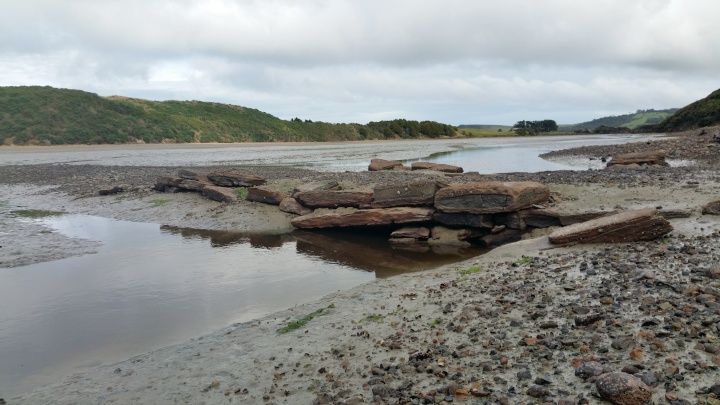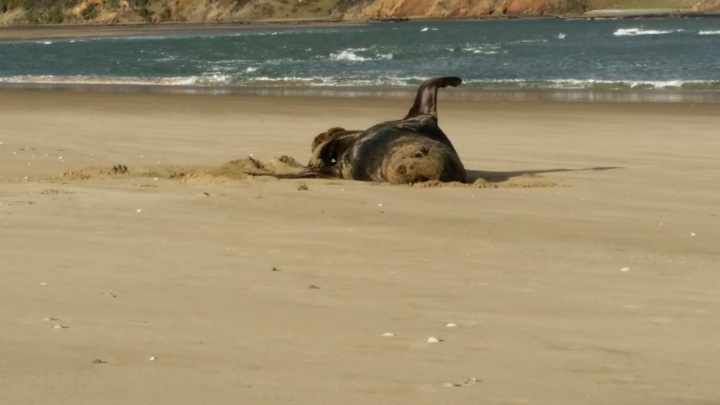They were defrosting leopard seal poo...
MEDIA RELEASENIWA is searching for the owner of a USB stick found in the poo of a leopard seal…
— NIWA (@niwa_nz) February 5, 2019
Recognise this video? Scientists analysing the scat of leopard seals have come across an unexpected discovery – a USB stick full of photos & still in working order! https://t.co/2SZVkm5az4 pic.twitter.com/JLEC8vuHH0
TUESDAY, FEBRUARY 5, 2019
They were defrosting leopard seal poo...you won't believe what happened next!
For more than a year a frozen slab of leopard seal poo sat in a NIWA freezer.
The poo, known scientifically as scat and about the size of two bread rolls, is as good as gold for leopard seal researchers. It can tell them what these Antarctic predators eat, a little bit about their health and how long they may have been in New Zealand waters.
It’s so valuable to scientific research that NIWA marine biologist Dr Krista Hupman and the team at LeopardSeals.org run a network of volunteer scat collectors up and down the country who gather the evidence and send it to her for analysis.
That’s why a local vet, out checking on the health of a skinny leopard seal resting on Oreti Beach, Invercargill, picked up a scat sample, packaged it up and sent it to Dr Hupman who popped it in the freezer.
That was November, 2017. And there it stayed until three weeks ago when it was removed by volunteers Jodie Warren and Melanie Magnan.
Theirs is not glamorous work.
First they must defrost the sample. “Then we basically have to sift it. You put it under the cold tap, get all the gross stuff off, smoosh it around a bit and separate the bones, feathers, seaweed and other stuff,” explains Jodie.
This was all happening when they discovered something large and hard. Concealed deep inside the scat was a USB stick. Jodie was not impressed.
“It is very worrying that these amazing Antarctic animals have plastic like this inside them.”
But the memory stick was in reasonably good condition considering where it had come from. So they left it to dry out for the next couple of weeks in the hope they may be able to see what information it contained.
And, ironically, there are photos of sealions at Porpoise Bay in the Caitlins and a video of a mum and baby sealion frolicking in the shallows The only clue to who might have taken them is the nose of a blue kayak.

If they’re yours and you want the USB stick back, it comes with a price. The leopard seal researchers would like some more leopard seal scat please.
“The more we can find out about these creatures, the more we can ensure they are looked after.”

Dr Hupman’s work also includes analysing leopard seal sightings in a bid to determine whether they are becoming more prevalent in New Zealand waters.
For more information on leopard seals and how to report a sighting seewww.leopardseals.org


 Electricity Authority: Authority Confirms New Next-Gen Switching Service; Proposes Multiple Trading Relationships For Consumers
Electricity Authority: Authority Confirms New Next-Gen Switching Service; Proposes Multiple Trading Relationships For Consumers Mānuka Charitable Trust: Mānuka Charitable Trust Warns Global Buyers Of Misleading Australian Honey Claims
Mānuka Charitable Trust: Mānuka Charitable Trust Warns Global Buyers Of Misleading Australian Honey Claims  Engineering New Zealand: NZ Building System Needs Urgent Improvement
Engineering New Zealand: NZ Building System Needs Urgent Improvement GNS Science: Bioshields Could Help Slow Tsunami Flow
GNS Science: Bioshields Could Help Slow Tsunami Flow Transport and Infrastructure Committee: Inquiry Into Ports And The Maritime Sector Opened
Transport and Infrastructure Committee: Inquiry Into Ports And The Maritime Sector Opened Netsafe: Netsafe And Chorus Power Up Online Safety For Older Adults
Netsafe: Netsafe And Chorus Power Up Online Safety For Older Adults


